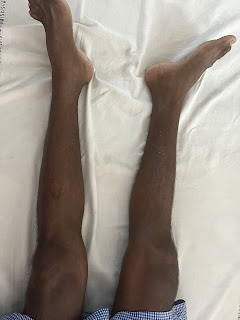35 year old male with history of giddiness
This is an online e log book to discuss our patient identified health data shared after taking his/her guardian signed informed consent. Here we discuss our individual patient problems through a series of inputs from available global online community of experts with a aim to solve those patients clinical problem with collective current best evidence based inputs.This blog also reflects my patient centered online learning portfolio and valuable inputs on the comments box is welcome.I have been given this case to solve in an attempts to understand the topic of patient clinical data analysis, to develop my competency in reading and comprehending clinical data including history, clinical finding, investigation.
CASE
A 35yr old male patient resident of chinakaparthy came to the casualty with
c/o giddiness since 2days (19/12/21) , non rotational , duration-10min, aggravated on standing , relieved by supine.
HOPI
Patient was apparently asymptomatic 2days back and had an episode of giddiness , where he went to the local RMP and was found to have increased BP and patient had given TAB .AMLONG , TAB .ATENOLOL and didn't have any episode of giddiness .
From yesterday morning patient again started c/o giddiness and from yesterday afternoon c/o vomitings - non bilious , 2-3 episodes , non projectile and came to our hospital for further evaluation .
H/o alcohol intake 2days back .
Past history
k/c/o DM since 10yrs .
Not a known case of HTN,TB, Asthma
Personal history
Diet - mixed
Appetite - normal
Bowel & bladder movements - regular
Addictions - occasional alchol intake and habit of tobacco chewing
Family history-not significant
On examination
Patient is concious, coherent and cooperative
No pallor , icterus , cyanosis , clubbing,lymphadenopathy , edema
Vitals
Temp - Afebrile
PR - 90bpm
BP - 150/90 mmHg
RR -14cpm
GRBS - 98%@RA
SpO2- 98%
Systemic examination -
CVS - S1 S2 +VE
RS -BAE +VE , NVBS +VE
P/A - soft , non tender , BS +ve
CNS - NAD
Provisional diagnosis -
Giddiness under evaluation secondary to
a) HTN ? b)Autonomic neuropathy ? with denovo HTN with diabetes
Investigations






